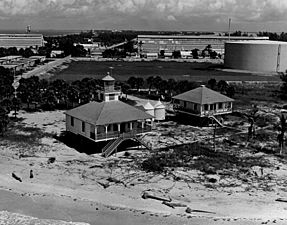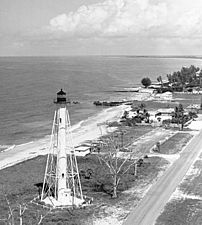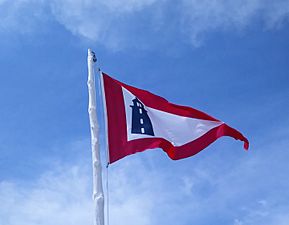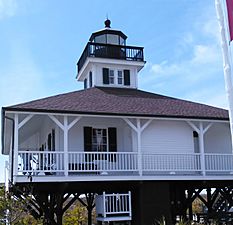Gasparilla Island Lights facts for kids
| Location | south tip of Gasparilla Island, on the Boca Grande Pass |
|---|---|
| Coordinates | 26°43′02.5″N 82°15′39.4″W / 26.717361°N 82.260944°W |
| Year first constructed | 1890 |
| Year first lit | 1890 |
| Automated | 1956 |
| Deactivated | 1966, reactivated 1986 |
| Foundation | iron screw piles |
| Construction | wood frame |
| Tower shape | octagonal lantern at roof peak of a square house |
| Height | 44 feet (13 m) |
| Original lens | three and a half order Fresnel lens |
| Characteristic | white light flashes every 20 seconds |
| Location | 2 miles north of Port Boca Grande Lighthouse |
|---|---|
| Coordinates | 26°44′31.4″N 82°15′48.8″W / 26.742056°N 82.263556°W |
| Year first lit | 1932 |
| Automated | 1956 |
| Deactivated | 2014, reactivated 2018 |
| Foundation | iron steel piles |
| Construction | wrought iron |
| Tower shape | skeletal tower |
| Height | 105 feet (32 m) |
| Original lens | fourth order Fresnel lens |
| Range | 10 nm (red sector) |
| Characteristic | white light with red sector, 6 second isophase period |
The Gasparilla Island Lights are two important lighthouses located on Gasparilla Island in Boca Grande, Florida. The Port Boca Grande Lighthouse stands at the southern tip of Gasparilla Island. It is part of Gasparilla Island State Park. This lighthouse helped ships find their way into the Boca Grande Pass. This pass leads to Charlotte Harbor.
Contents
Port Boca Grande Lighthouse: A Guiding Light
The Port Boca Grande Lighthouse first shone its light on December 31, 1890. It is a two-story wooden house built on strong iron "screw-piles." These piles are like giant screws that hold the building up. The light itself is in a small tower, called a cupola, on the roof. The lighthouse keeper used to live right inside the lighthouse. There was also a similar house nearby for the assistant keeper.
Why the Lighthouse Was Important
When it was first built, the Port Boca Grande Lighthouse helped ships carrying cattle from Charlotte Harbor to Cuba. In the 1890s, Phosphate ore became a very important cargo. This ore came from the Peace River area. In 1909, a railway called the Charlotte Harbor and Northern Railway was built to Port Boca Grande. This made ship traffic even busier. During World War II, Port Boca Grande was a safe place for ships in the Gulf of Mexico. More than 30 ships a day passed through!
Saving the Lighthouse
The Gasparilla Island Light was turned off in 1966. The Coast Guard stopped using it in 1969. Over time, the buildings started to fall apart. By 1970, the beach was washing away, and waves were crashing under the lighthouse. To protect it, two rock walls were built, and new sand was added to the beach.
In 1972, Lee County took over the lighthouse. On February 28, 1980, it was added to the National Register of Historic Places. This meant it was recognized as an important historical site. Restoration work began in 1985. In 1986, the light was turned back on!
In 1988, the lighthouse and the land around it became part of Gasparilla Island State Park. In 1999, the Historic Port Boca Grande Lighthouse and Museum opened to visitors. The Barrier Island Parks Society now runs the museum. The U.S. Coast Guard still maintains the lamp room. This means they make sure the light continues to help ships navigate.
Gasparilla Island Light: A Second Chance
The Gasparilla Island Light has an interesting history. It was first built in 1885 in Delaware. It was called the Delaware Breakwater Range Rear Light. Because of beach erosion, it was taken apart in 1918.
Moving and Reassembling the Light
In 1921, the tower was taken apart piece by piece. Then, in 1927, it was put back together on Gasparilla Island. However, its light did not shine until 1932. It became the rear entrance range light for Port Boca Grande. There was also a front entrance range light about one mile offshore. When ships' navigators saw these two lights line up, they knew it was the right time to turn and enter Boca Grande Pass. Even though the front light is gone, the Gasparilla Island Light still helps guide ships today. The U.S. Coast Guard also maintains this light.
Restoration and Reopening
The Coast Guard turned off the Gasparilla Island Light in 2014. In 2016, the lighthouse was given to the Barrier Islands Parks Society. The society decided to restore the lighthouse. They even put in a copy of its original Fresnel lens. Starting in April 2017, people could climb the tower on certain days. The light was switched on again in 2018. Today, the light flashes every six seconds.
 | DeHart Hubbard |
 | Wilma Rudolph |
 | Jesse Owens |
 | Jackie Joyner-Kersee |
 | Major Taylor |





